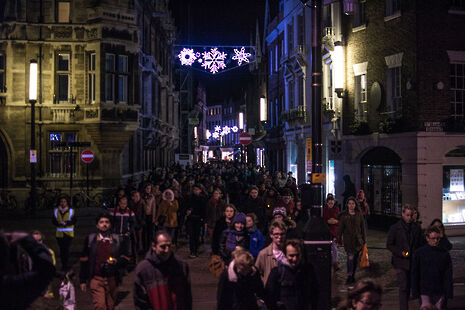Cambridge stands united for victims of terror
The ‘Silence the Violence’ vigil on Wednesday night was attended by about 250 people

Cambridge students, university staff and residents took to the streets on Wednesday in a candlelit vigil to “stand in solidarity with the victims and survivors” of the terror attacks in Paris, Beirut, Sinai and Baghdad, and against the “scapegoating” of migrants and refugees since the attacks.
The ‘Silence the Violence’ vigil saw roughly 250 people march from Magdalene Bridge to Great St Mary’s Church in Market Square, holding candles, lanterns and tributes to the victims of Friday’s Paris attacks, in which 129 people were killed in attacks at six locations, including the Stade de France, the Bataclan concert hall, and multiple bars and restaurants across the city.
The march saw a wide range of attendees, from students and French nationals to figures from Cambridgeshire Left, who hosted the rally.
Many marchers held candles and lanterns, as well as placards showing “Pray for Paris” and the Eiffel Tower peace symbol that was popularised after the attacks.
One attendee said that despite not having lost anyone, she had a friend living in the block outside the Bataclan, visible in some of the videos of concert goers fleeing from the armed shooters.
One student from New York said they “remember 9/11 vividly”, emphasising passionately that refugees should not be treated with suspicion following the attacks, stating that of the Syrian refugees who travelled to America after 2001, “not one has been arrested on terrorism charges” (although the truth of this claim has been disputed).
Others also used the vigil as an opportunity to push political messages. A French speaker, addressing the crowd outside Great St Mary’s Church, said: “I was in Paris on Friday. A life is a life. We won’t solve this by redoing what we did in 2001.
“What Western governments have done in response to terrorism is terrorism.”
Many other speakers from Stop the War and Cambridgeshire Left spoke similarly, with speakers attacking Western leaders, multi-national corporations and international capitalism.
One speaker read poetry to the crowd, in which he accused figures such as Obama, Cameron, Reagan and Thatcher of being the cause of Islamic terrorism against the West. The speakers were met with muted applause.
One of the organisers, Karin Bashir, struck a broader tone.
Speaking to Varsity, she said: “We wanted to do the vigil as it was horrible what happened in Paris, but also in Beirut and Baghdad.
“[The victims’] cries have not fallen on deaf ears. We wanted to show people that we care. It is important that cities like Cambridge come together to send a message of solidarity and in defence of peace.
“It is great to see hundreds of people from all walks of life come together. It is really beautiful and important.”
The attacks sent shockwaves across the world, with cities lighting up landmarks in the French Tricolour, holding minutes of silence, and world leaders promising to stand in solidarity with France in its efforts to bring the attackers to justice.
At a friendly match at Wembley between France and England, attended by Prime Minister David Cameron and Labour Party leader Jeremy Corbyn, English football fans joined with their French counterparts to sing La Marseillaise, the French national anthem, in solidarity with the victims of the attacks.
Following the attacks, President François Hollande declared that “France is at war”, sanctioning strengthened bombing raids on ISIS targets, and announcing his intention to invoke Article V of NATO’s Washington Treaty and Article 42.7 of the Treaty on European Union, both of which would require NATO and EU countries to come to France’s aid as the “victim of armed aggression”.
Hollande also declared an official state of emergency, requesting the French Parliament to extend this to a period of three months. This would give authorities a string of exceptional powers, including the ability to set curfews, forbid mass gatherings, limit the movement of people, close public spaces, and establish zones where people can be monitored. Public demonstrations have already been banned until 22nd November.
French and Belgian security forces have carried out hundreds of raids since Friday, including one against the man who is believed to have been the “mastermind” of the attacks, Abdelhamid Abaaoud. More than 5,000 rounds of ammunition were fired by police in that raid. Abaaoud’s body was formally identified on Thursday afternoon.
Another rally is planned for 20th November by the French community in Cambridge, to stand in solidarity with the victims, their families and the people of Paris, and will be attended by Cambridge MP Daniel Zeichner and Labour MEP for the East of England Region Richard Howitt.
It is due to take place at 2pm outside Great St Mary’s Church.
 Features / How sweet is the en-suite deal?13 January 2026
Features / How sweet is the en-suite deal?13 January 2026 Comment / Will the town and gown divide ever truly be resolved?12 January 2026
Comment / Will the town and gown divide ever truly be resolved?12 January 2026 News / 20 vet organisations sign letter backing Cam vet course13 January 2026
News / 20 vet organisations sign letter backing Cam vet course13 January 2026 Arts / Fact-checking R.F. Kuang’s Katabasis13 January 2026
Arts / Fact-checking R.F. Kuang’s Katabasis13 January 2026 Music / Inside Radiohead’s circle13 January 2026
Music / Inside Radiohead’s circle13 January 2026









